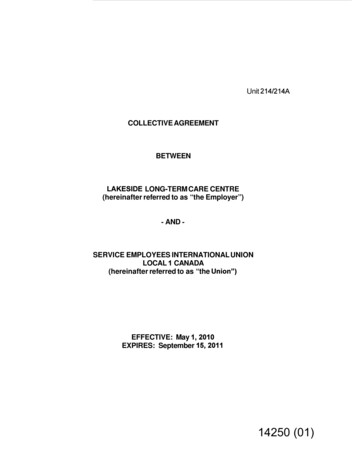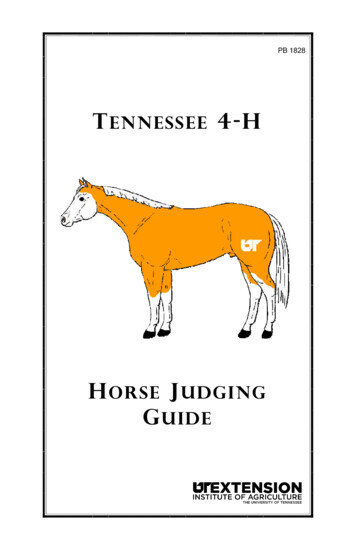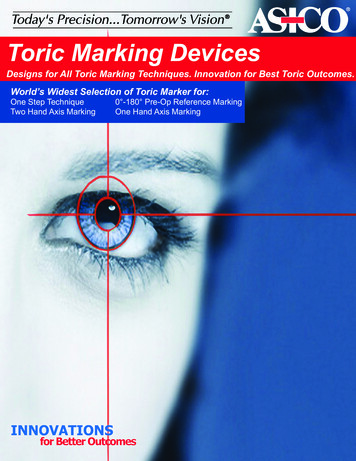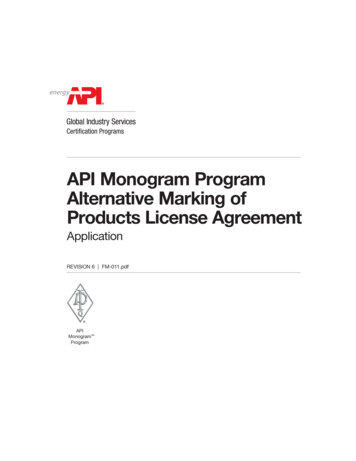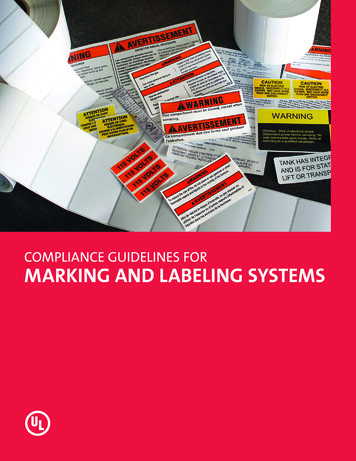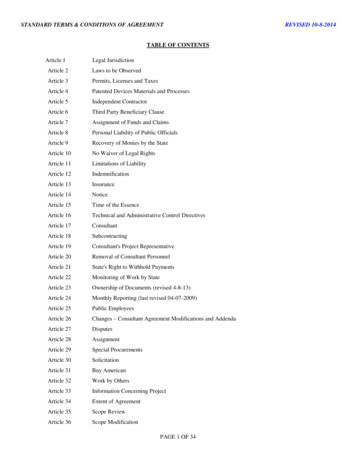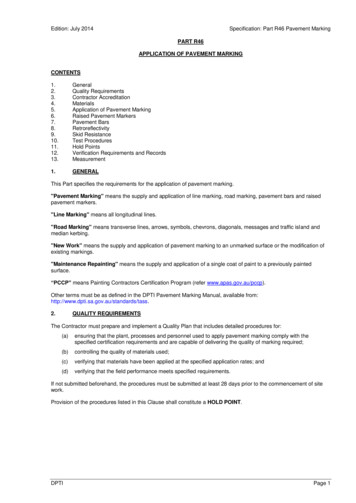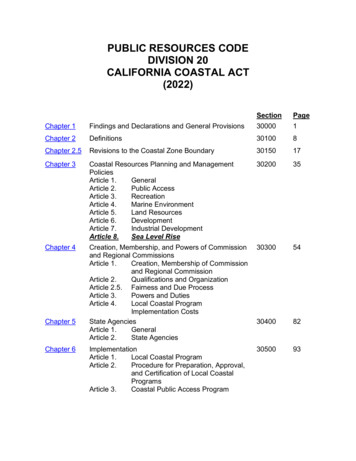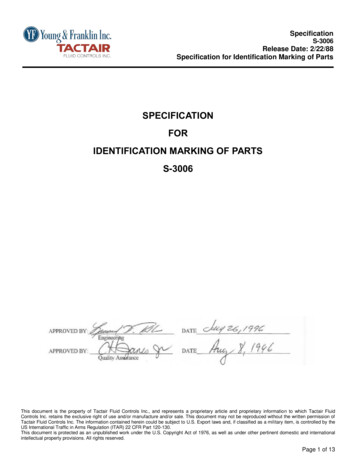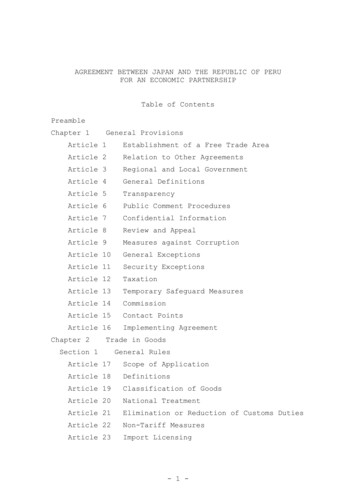
Transcription
Mannix et al. BMC Nursing 2013, ESEARCH ARTICLEOpen AccessMarking out the clinical expert/clinical leader/clinical scholar: perspectives from nurses in theclinical arenaJudy Mannix1*, Lesley Wilkes2 and Debra Jackson3AbstractBackground: Clinical scholarship has been conceptualised and theorised in the nursing literature for over 30 yearsbut no research has captured nurses’ clinicians’ views on how it differs or is the same as clinical expertise andclinical leadership. The aim of this study was to determine clinical nurses’ understanding of the differences andsimilarities between the clinical expert, clinical leader and clinical scholar.Methods: A descriptive interpretative qualitative approach using semi-structured interviews with 18 practisingnurses from Australia, Canada and England. The audio-taped interviews were transcribed and the text coded foremerging themes. The themes were sorted into categories of clinical expert, clinical leader and clinical scholarshipas described by the participants. These themes were then compared and contrasted and the essential elementsthat characterise the nursing roles of the clinical expert, clinical leader and clinical scholar were identified.Results: Clinical experts were seen as linking knowledge to practice with some displaying clinical leadership andscholarship. Clinical leadership is seen as a positional construct with a management emphasis. For the clinicalscholar they linked theory and practice and encouraged research and dissemination of knowledge.Conclusion: There are distinct markers for the roles of clinical expert, clinical leader and clinical scholar. Nursesworking in one or more of these roles need to work together to improve patient care. An ‘ideal nurse’ may be ablending of all three constructs. As nursing is a practice discipline its scholarship should be predominantly basedon clinical scholarship. Nurses need to be encouraged to go beyond their roles as clinical leaders and experts touse their position to challenge and change through the propagation of knowledge to their community.Keywords: Clinical scholarship, Leadership, NursingIntroductionIn the context of contemporary nursing the crucial needfor clinical leadership and clinical expertise (proficiency)abounds. In conjunction with this there is a cry for clinical scholarship. In the late 1990s Sigma Theta Tau International [1] espoused that clinical scholarship was “anapproach which enables evidence-based nursing and thedevelopment of best practice to meet the needs of clients efficiently and effectively” (p4). This influentialinternational society goes on to state that this clinicalscholarship can only flourish if both clinical and* Correspondence: j.mannix@uws.edu.au1School of Nursing and Midwifery, University of Western Sydney, Locked Bag1797, Penrith, NSW 2751, AustraliaFull list of author information is available at the end of the articleacademic organisations embrace it. Clinical scholars areviewed as those nurses who are reflective, curious, critical thinkers who contribute to the clinical environmentthrough sharing their knowledge with the broader nursing and general community [1]. In this paper we consider the notion of the clinical scholar, and question if itis any different from a clinical expert or a clinical leader.BackgroundIn reviewing the literature on clinical scholarship/scholarno research data-based studies were found. The writingsare discussion papers or views of experts in nursing.Mohide and Coker [2] suggest that clinical scholarshipin nursing goes beyond expertise, linking it with evidence of practice. As Diers [3] so eloquently states, 2013 Mannix et al.; licensee BioMed Central Ltd. This is an Open Access article distributed under the terms of the CreativeCommons Attribution License (http://creativecommons.org/licenses/by/2.0), which permits unrestricted use, distribution, andreproduction in any medium, provided the original work is properly cited.
Mannix et al. BMC Nursing 2013, linical scholarship is simply “the study of the natureand effect of nursing” (p2). This is affirmed by Roth [4]in a lecture to medical practitioners where he states clinical scholarship refers to clinical practice and includesclinical competence (expertise, proficiency). Thus, asPalmer [5] stated in the 1980s, nurses must bridge thegap between nursing action and nursing thought, orthinking/doing nursing. This reflects the idea of a theory/practice gap: an issue that has long confoundednursing scholars. In the 1990s Walker [6] highlightedthe tensions between thinking and doing nursing; andthis tension continues, despite increasing numbers ofclinical nurses pursuing higher degree education and research [7,8]. These pursuits are often seen internationally as essential criteria for clinical expert positions.Within the current nursing agenda to improve nursingpractice and patient/client outcomes, clinical leadershipis often advocated as an essential element [9-11]. Clinicalleadership is often linked to solutions for clinical problems that can range from specific clinical problems [12]through to health workplace nursing roles [13]. From anextensive review of research-based literature on the clinical leadership construct, it was found that characteristics of clinical leadership more commonly focussed onpractical and technical skills required to lead a team andpractise in a clinically competent manner [14]. In this review of research papers it was found that clinical leadership attributes had a clinical focus, a follower/teamfocus or personal qualities focus; attributes necessary tosustain supportive workplaces and build the capacityand resilience of nursing workforces.Clinical expertise can be seen as an essential component of clinical leadership. Studies on expertise in nursing became popular after the seminal work of Benner[15] in her description of growth from novice to expert.She described an expert as someone who knows how andknows that and has both personal and experientialknowledge to use intuition in practice, particularly indecision-making. The nurse expert is someone who hassuperior performance in their everyday work life [16].Work into the 1990s and 21st century has focussed onhow expert nurses discern cues and make decisions differently to novice practitioners [16-18]. In the context ofwhat role they perform in practise they can be seenas advanced practice nurses. Much research isconducted in this area but Heals [19] sums up their rolesuccinctly as: providing expert clinical practice, facilitating change, disseminating evidence-based practice andimproving communication in and beyond the healthteam. Thornley and West [20] state these nurse expertshave an obligation to share their knowledge with novicepractitioners and should mentor these nurses.If scholarship is at the heart of what a profession is,then clinical scholarship must be central to the nursingPage 2 of 8discipline [21]. The discipline’s philosophy, theory andpractice are intertwined and as reflected in Boyer’s ideas,scholarship in nursing can come from four scholarly activities: discovery (research), integration (connectionsacross disciplines), application (practice), and teaching.It is argued by Starck [22] that clinical scholarship, whilehaving significant focus on practice, would also bridgethe other three scholarly activities.Over the decades, scholarship or scholarliness hasbeen discussed and seen as an essential component ofthe discipline and its practice. Armiger [23] definesscholarliness as being able to argue various points ofview, being dedicated and flexible. Others suggest it isbeing visionary, pursuing excellence, proficiency andmastering systematic knowledge [24,25]. As Kitson [26]states emphatically, “true scholarship is both the breadthand depth of knowledge an individual has in a particularsubject area” (p540) and its development is essentialto the nursing discipline. Kitson [26] and others[22,24,27,28] emphasise the need for post graduate students in nursing and in particular, doctorates groundedin clinical practice, to build a stronger culture of inquiryand scholarship in the clinical environment. No evidenceof research-based data was found in the literature thatexplores whether nurses in the 21st century see clinicalscholarship as essential to their practice or more broadlyto their discipline.In this context, this paper reports the findings from astudy in which it was sought to determine clinicalnurses’ understandings of clinical scholarship. In thispaper the emphasis is on the clinicians’ perceptions ofthe differences in the construct of the roles of clinicalscholar, clinical expert and clinical leader.MethodA descriptive interpretative qualitative approach wasused in this study which was conducted in three countries – England, Canada and Australia. The methodologyutilised was naturalistic inquiry which has the premisethat individuals understand the world differently, but bycomparing and contrasting these views, a common understanding can be interpreted [29]. The primary focusof the major project was to define clinical scholarship.ParticipantsThe participants in the study were nurses currentlyworking in a clinical role and who were students orgraduates of the post graduate program in nursing (Master of Nursing or Doctorates). They were recruitedthrough a modified snowballing approach at five universities (one in Canada, three in England and onein Australia).
Mannix et al. BMC Nursing 2013, age 3 of 8Data collectionTable 1 Participant demographic characteristicsData was collected using a semi-structured interviewtechnique with a set of questions relating to how participants would define the characteristics of clinical scholarship and asked if there were any differences betweenclinical leadership, clinical scholarship and clinical expertise. All interviews were audio taped and transcribedas text.Demographic characteristicData analysisThe text from the interviews was entered into NVivo[30] and this program was used to manage and sort thetext for the participants’ perceptions of the characteristics of the three different clinical roles. The characteristics of the role were compared and contrasted andessential elements of the nursing roles of the clinical expert, clinical leader and clinical scholar were extractedand tabulated for discussion.EthicsThis project complies with the Helsinki Declaration [31].The project was approved by the University of WesternSydney Human Research Ethics Committee, approvalNo: H8453. All participants volunteered to be interviewed with a written information sheet presented toparticipants before they signed a written consent form.The project was of low personal risk and to protect theiranonymity and confidentiality no personal details arereported in this paper with pseudonyms used to providea context for exemplars used in findings.ResultsTable 1 details the characteristics of the participants.The 18 participants for this study worked in three countries: England (13, 72.20%), Australia (4, 22.22%), andCanada (1, 5.56%). As seen in Table 1, there was aspread of ages with an average of 42.2 years with a rangeof 29 to 67 years. The first qualification in nursing forthe group was spread fairly evenly across hospital certificate, diploma or bachelor degree. The most commonhighest tertiary qualification was a Master in Nursing(10, 55.56%). The average clinical experience of thegroup was 17 years with a range of 1.5 to 30 years.While two of the participants were working in academicpositions, they worked part-time in clinical practice.Marking out the clinical scholar/clinical expert/clinicalleaderWhile the emphasis of this project was defining clinicalscholarship, it became apparent that the nurse participants saw distinct differences in being a clinical scholar,clinical expert or clinical leader. These differences arehighlighted in Table 2. The ideal for most of the nursesinterviewed was for a nurse to be a combination ofn 18%Male422.22%Female1477.78%GenderAge in yearsRange29 to 67Average42 3015.56%31-40738.89%41- 50844.45%51 to 60211.12%Hospital Certificate738.89%Bachelor Degree527.78%Diploma633.34%Graduate Diploma211.12%Bachelor Honours211.12%First nursing qualificationHighest tertiary qualificationMasters1055.56%PhD422.22%Years of clinical experienceRange1.5 -30Average17 5316.67%6 -10211.12%11- 1515.56%16 - 20527.78%21 - 25527.78%26 - 30211.12%Paediatrics422.22%Adult critical care633.3.4%Non-clinical211.12%Adult general633.34%No1372.22%Yes527.78%Clinical areaDo you consider yourself a scholar?clinical scholar and clinical leader or clinical scholarwith clinical expertise or a combination of all three. Thenurse participants felt scholarship was particularly important for a clinical expert. For example: To be an expert you need to show a certain amount of scholarship(M3), and, I think to be an expert you need to be ascholar (A1).There was a sense that while leadership and expertisecould be associated with the jobs people hold, there was
Mannix et al. BMC Nursing 2013, age 4 of 8Table 2 Comparisons between clinical expert, clinical leader & clinical scholarMarkers of roleClinical expertClinical leaderClinical scholarParameters of roleLocalLocalBroadPrimary emphasis of PracticeroleTeam, communicationDissemination of evidence for practice –ideal practiceKnowledge sourceMostly practice based rather thanacademicExperience emphasis with someacademicAcademic emphasis but with some clinicalexperience.Knowledge sharingNot always sharedShared locallyBroad sharingPractice –researchlinkTranslate evidence to practice Some doresearchNot emphasisedDo practice focused researchVisionNot evidentYesYesMotivating othersYesYesYesalso recognition that individuals had leadership qualitiesand were seen as experts, and this was separate from theroles or positional power they had. As one participantindicated:there are some people who are clinical experts, andpossibly clinical leaders and some of these people I’vescoped around the UK. . . who they are and the jobthey do, [Which] will encompass all three roles butothers just fit into individual components (L1).For some nurses, there was a perception that clinicalscholarship and expertise were different but there wassome uncertainty about the exact nature of the differences. For example, participant M3 likened the processto a journey:. . . it’s about the journey and when you are an expert,it is about disseminating the knowledge, and clinicalscholarship is about gaining the skills on the road tobecoming an expert (M3).As indicated in Table 2, the nurse participants perceived there were similar and different markers for eachof the three roles. The crucial markers were identifiedas: parameters of the role, primary emphasis of the role,source and sharing of knowledge, practice-research link,vision, and ability to motivate others. Each of these elements will be discussed.Parameters of the roleIt was clear from the interview texts that for the nurseparticipants the nursing focus of the scholar was, in themain, different from that of the leader or expert. Thescholar was seen to have a broad and holistic knowledgeof nursing: [the] Clinical scholar is someone with abreadth of knowledge, engages with nursing and knowshow to blend teaching, engaging with the discipline andlinking theory and practice (A4). On the other hand, thenurse participants saw a leader or expert in a very localclinical arena with specific knowledge and skills for thatarea of practice. They saw an expert as someone withknowledge of a specific field. Another nurse participantthought clinical leaders often do not have as broad aview of nursing as a scholar (A4). However, one nurseparticipant saw a leader’s role usually as having a narrownursing focus but sometimes could be broader: clinicalleadership is very narrow, it doesn’t necessarily mean thewider clinical community, it may be a very local role,even though it can be broad (A3).Primary emphasis of rolesFor the nurse participants, the three roles had distinctlydifferent emphases. For the clinical expert their primaryfocus was their specialty practice and providing patientcare: I think an expert is in contact with the clinicalpractice more than nursing research while the scholarcombines nursing research, nursing development andnursing practice (S1).The clinical leader was seen as being team focussedwhile maintaining relationships in and outside the teamfor effective decision-making and seen as a linchpin incommunication for their local area of practice. It isabout getting people on board, they’re managers (L2);they are like the nurse unit managers and clinical nursesspecialists, they mentor and things like that, but itdoesn’t mean they engage in clinical scholarship (A2).Further, from another participant:Clinical leadership is being able to look at the areawhere you are working, assess it, evaluate it and that’songoing and it’s about leading people to betterpractice, innovation in practice. . . always helping. . .it’s going to be about change and collaborating. . .leading people through processes. It’s about people(M1).The clinical scholar is focussed on gaining evidence ofnursing practice outcomes with an emphasis on disseminating this knowledge:
Mannix et al. BMC Nursing 2013, t is having knowledge and the ability in the workplacefor it. To disseminate what you know to a very broadaudience and to be peer reviewed on what you writeor speak and it’s like it cannot come by itself, it has tobe in the broader nursing community (C1).Knowledge source/knowledge sharingClinical leaders and experts were seen by the nurse participants as gaining much of their knowledge for theirrole from practice. Conversely, the clinical scholar wasconsidered to be more academically focused in gainingtheir knowledge base, while still drawing on the knowledge gained from their own clinical experience. Theparticipants saw an interdependence of their knowledgeand its source.I think the expert has a lot of experience and thereforeknowledge in their clinical field whereas the scholarhas a better overview of how things connect. . . theydepend on each other; the expert in terms ofexperience . . . the scholar in terms of broaderknowledge (M1).For another nurse participant, the expert may have experiential knowledge but they did not always reflect onwhat they do . . . an important process, sometimes you doit informally but unless you discuss with others, write itdown, that sort of formal stuff is important (L2). Thiswriting and formal dissemination outside the clinicalarena was only noted in the interviews when the nurseparticipants were discussing the clinical scholar.Four of the nurse participants often felt the clinical expert was not always willing to share their expert knowledge or skills, preferring to keep it to themselves:some experts are very powerful in the profession. Youknow, knowledge is power, sometimes in our professionI run into people whose main goal is to controlknowledge because that makes them very powerful intheir workplace and they don’t share. For example, Iworked on a specialist floor and there was an extendednurse coordinator for palliative care, pain andsymptom management and yet not a single nurse onthat floor knew what she knew (C1).This idea of holding on to knowledge was in conflictwith how many of the nurse participants saw the idealclinical expert as someone sharing and providing a newgeneration of nurses with access to their expert clinicalknowledge.Ideally, the clinical leaders and scholars were seen asvery willing to share and help others so they could grow.For the leader this sharing was usually within the organisation or their specialty. The clinical scholar wouldPage 5 of 8disseminate to the broader nursing and public community through teaching and various forms of media suchas writing, speaking and policy development. As oneparticipant relayed, a clinical scholar is able to disseminate to a very broad audience and to be peer reviewed onwhat you write or speak and it’s like scholarship cannottake place by you, it has to be in the broader nursingcommunity (C1).Practice–research linkThe nurse participants did not emphasise any practiceresearch link for the clinical leader role. Although theysaw them as gaining knowledge from academic sourcesthey did not, in the main, see translation of research intothe leadership role. They wouldn’t be interested in research, they want to do basic clinical work but theywould not be interested in looking at advanced knowledge (M4).The clinical experts were seen to translate researchoutcomes into practice and this was an important element of the role. They were also seen as doing researchprojects but often not disseminating this to the broadercommunity.I would expect . . .[a clinical expert]. . . to translateknowledge generated by research to clinical care, so Iwould expect for example, a policy to be up-to-dateclinically on new and novel ideas or what practiceshould be, what safety issues are and, for example,then be able to incorporate them into mandatorytraining (L1).The clinical scholar is seen as someone who is there tohelp clinicians and the clinical expert translates theknowledge from research: As one participant indicated,the clinical scholar did research which was practicebased and was disseminated and shared with thebroader community (L1). Another participant viewed aclinical scholar as being research orientated. . . being ableto understand the evidence from research and then takethat into practice and that theory knowledge gap hasbeen huge for a long time (L2).VisionVision was seen as an important element of the role forclinical leaders and clinical scholars but was not as evident in the interview texts for the clinical expert role.However, the concept of vision may be linked to whatsome nurse participants recounted as an importantelement of the expert – the risk-taker and allowingothers to take risks. For example, one clinical expertgave us a licence to learn and it was OK that we didn’tlearn the way she learnt (M1). The concept of risk-taker,although not verbalised, was also evident in the nurse
Mannix et al. BMC Nursing 2013, articipant’s perception of the role of the clinical scholarand leader, with such terms as foresight, authority tochange, create for yourself, set goals for change (M2). Forthe clinical leader, they need to share a vision withpeople, offer them something they see as being of value,more face-to-face value than maybe the scholar whose vision may be detached from the clinical area (C1).Motivating othersAll roles had an important element of motivation. Forexample: management is just following orders and applying a system, applying instructions, applying theories.Leadership is kind of different in some way where youhave to inspire; you have to motivate your followers (S2).One clinical expert was seen as a breath of fresh air, shewas fantastic, inspiring, because what she didn’t knowshe looked up and she would come back and tell you. Shemotivated you to know. . .you would be looking things upto impress her (A1). As one nurse participant reflected –a clinical scholar herself.While they . . . [clinical scholars] are motivating theyalso need a workplace that promotes and encouragesscholarship, in that it is valued, there is no value on itin places I’ve worked. I now see it is important todevelop my team’s scholarly ways. Scholarly academicpursuits have changed me and I want to inspire otherclinicians to set goals and make a differenceorganisationally and clinically (L1).DiscussionIn their perceptions of the clinical expert, the participants in this study saw this nurse as similar to that proposed by Thornley [32], that is, as a role model whoencourages, inspires and assists others to reach clinicalcompetence. These experts have gone beyond the ‘doingnurse’ described by Walker [6]. They do link thinkingand doing to improve nursing practice and patient care.In this way, they also embody attributes of leadership.In the view of most of the participants, the clinicalleader is described mostly in the context of hierarchical,positional leadership [33], such as a nurse managerwhere the process of organising a unit or ward (i.e.,managing, making decisions, team building, communication) is emphasised. The participants have a fairly limited view of clinical leadership and their perceptions arevaried, with few common views. However, the personalattributes of clinical leadership clearly emerge. Leadership styles and associated personal attributes such asthose found with transformational leadership [34,35]find the leader transforming the values of followers tosupport the vision of the organisation by fosteringan environment where there is trust and where the vision is shared. In the clinical leadership literature, aPage 6 of 8transformational leadership style is often cited as thepreferred style of clinical leadership to achieve positiveoutcomes for nursing staff in clinical settings [36-38].There were indications of this style of leadership in theclinical leaders discussed by the participants in thiscurrent study when describing the need for leaders tohave vision and sharing this vision, as well as inspiringand motivating others. These attributes are similar tothose identified by Stanley [39] who found clinical leadership to be based on personal values and beliefs ofnursing and care. Similar to the current study Stanleyfound that “the attributes of the clinical leader were clinical competence, clinical knowledge, approachability,motivation, empowerment, decision-making, effectivecommunication, being a role model and visibility” ([39]p 20). In this current study, visibility was not evident forthe clinical leaders in the broader community of nursing,but rather in the local ward or unit.The nurses’ perceptions of the clinical scholar reflectthe theoretical work on the construct evident in the literature since the early 1980s [1,3,5,24-27]. The findingsreflect the curiosity of the scholar, the linking of theoryand practice by doing practice-based research, the development of an environment to share the results of research with a broader community, and the nature andeffect of nursing. Motivation and inspiration are also important aspects of this role.Stockhausen and Turale [40] found these essential features of Australian nursing scholars as perceived byrecognised academic and clinical scholars. One essentialfeature of the clinical scholar is practice-based researchwhere results are disseminated; knowledge shared andtranslated into practice both locally and to the broadercommunity. These attributes have been highlighted inliterature related to clinical scholarship in other healthdisciplines, for example occupational therapists [41],medicine [42]. There is an emerging emphasis in somenursing curricula to teach clinical scholarship [27,28].However, it may be a construct that needs to developfrom practice rather than theory. An academic researchfocus by nurses can enhance this scholarship but the research needs to move from the academy to the clinic. Italso needs to move from practice-based research to theacademy [43].Nurses in all three roles or their amalgam need towork together so that patient care is enhanced. There isa movement to basing research in practice and involvingnurse clinicians by exploring their values of patient careand the context in which this care is being enacted.Practice development units in the late 20thCenturytended to explore nursing rather than patient care[44,45]. There are a number of movements globally, including Canada [46] and United Kingdom [44,47] thatemphasise translation of research to practice. These
Mannix et al. BMC Nursing 2013, arlier translation models were very linear based[26,44,48]. More recently, a movement to establish amore action research approach within a transformationalpractice development framework in the practice arenahas evolved with the development of a change cultureaddressing value development of the practitioners [45].This approach has been advocated and taken up by anumber of health services in Australia. The Essentials ofCare program propagated by NSW Health [49] is onesuch program and this has encouraged research to promote patient care coming from the shared values of clinicians. From personal observation of the authors andfeedback from clinicians and the health department atlocal seminars, significant clinical change is taking placewith this approach to enhance patient care [50,51]. However, one of the disadvantages of this approach is thatthere is tendency for the activity to be limited to onelocal area such as a ward or unit and not be disseminated to the broader nursing community. The participating clinicians see the program as quality assuranceexercises and they do not go through the usual researchethics procedure to enable publication. Clinical scholarsneed to work collaboratively to challenge and changethis thinking.In order to achieve the goals of the roles of clinical expert and clinical scholar, education programs that emphasise these roles and concepts are needed. Nurseswho are educated to a Masters or doctoral level areneeded in both the academic and clinical arenas [8,52].These roles and their characteristics, however, need tobe developed with a blend of academic and clinician input. Action based research is one method of achievingthis.Limitations of the studyThis study, like most qualitative research is limited bynumbers of participants. However, if the findings areseen within the context of constructivism [29] whereeach of us see the world differently but our combinedperceptions often
Within the current nursing agenda to improve nursing practice and patient/client outcomes, clinical leadership is often advocated as an essential element [9-11]. Clinical leadership is often linked to solutions for clinical prob-lems that can range from specific clinical problems [12] through to health workplace nursing roles [13]. From an
